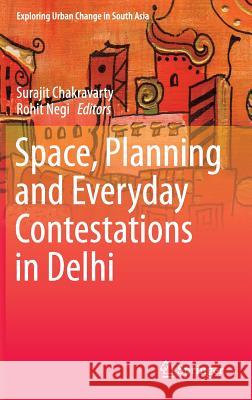Space, Planning and Everyday Contestations in Delhi » książka
Space, Planning and Everyday Contestations in Delhi
ISBN-13: 9788132221531 / Angielski / Twarda / 2016 / 233 str.
This interesting volume discusses urbanization in India's national capital, Delhi, through its effect on marginal spaces and everyday life. It moves away from analyses of spectacular megaprojects and sites of consumption, towards "ordinary" spaces and contestations. These spatial contestations have the potential to reveal the processes, relations, and logic through which the city's grand plans are executed. The contributors argue that urbanization is actually negotiated and muddled, in particular, through spaces of informal labour, mass resettlement districts, and niches occupied by small-scale capital investments. The critical analyses in this volume shed light on disjunctures between planning and ideology, narratives of growth and realities of immobility, and facades of modernity and the spaces and practices produced in its pursuit. The studies report current empirical work from a variety of sites, investigating the dynamics of capital investment, state planning and citizen response in these spaces. The book is organized into five sections - (i) Citizenship claims, (ii) (Un)settled communities, (iii) Heritage between planned and lived space, (iv) New morphologies of capital, and (v) Spaces of engagement and community. Developmentalism in Delhi reveals a subliminal disarray of thought and action. The chapters rub broader conceptual questions against experiences on the ground. As such, this volume provides fresh insights into the nature of urban planning and governance in an Indian megacity two decades after the unveiling of neoliberalism.











